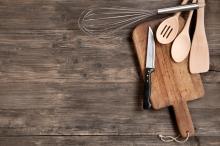Let's Cook, Baby!

This post is an installment in our 52 Health Hinges series. Remember, “Small hinges swing big doors.”
I used to say that my favorite food was anything that was prepared for me. I went to a restaurant every day for lunch (or ate in my work cafeteria, best described as “grim”), and my husband and I would go out for dinner multiple times each week.
Over time, we have shifted our habits where most of our meals are now made at home from scratch.
Today, I want to share three benefits to cooking at home, and encourage you to start, increase, or continue cooking for yourself.
1. It costs less. Yes, I’ve heard the jokes about Whole Foods being called Whole Paycheck, but if you’re a savvy and plan-ful shopper, you should be able to save money by cooking your own food versus relying on packaged foods and restaurants.
And to look at the cost of food from a different angle, I love what food journalist Michael Pollan shared in a 2010 appearance on Oprah. He said, “Do you want to pay now for groceries or pay for a doctor later? When I was a kid, we spent 18% of our income on food and 5% on healthcare. Now we spend 9% on food, and 17% on healthcare.”
I’ll take the groceries, please!
2. It’s healthier! When you cook something yourself, you know EXACTLY what’s in it. On the other hand, when you leave it to corporations to cook for you, your food will be of lower quality (they will use the cheapest ingredients they can get away with) and it will be full of salt, sugar, or fat.
Have you ever looked at a list of ingredients on a processed food label and wondered what some of these ingredients are? If you can’t recognize an ingredient in the list, chances are your body doesn’t really know what it is, either.
Check out this segment from 60 Minutes that discusses how “flavorists” use chemicals to mimic the taste of real food in such a way that it’s irresistible and stimulates cravings (this gets you to eat more, and eat it more often). I love modern science, but when it comes to my food I trust Mother Nature over a chemist every time. Are you with me?
3. It activates the powers of digestion. In a similar vein as our chewing challenge a couple of weeks back, taking the time to prepare your food will help your brain get your digestive juices flowing. During the first phase of digestion, called the cephalic phase, the sight, sound, smell, and thought of food triggers the brain to transmit signals down your central nervous system to prepare your body for digestion.
Just as we discussed with chewing, helping to prepare your digestive system can help reduce gas and bloating while maximizing the absorption of nutrients.
For even more discussion on the history and benefits of cooking, Pollan talks at Google about his book, Cooked: A Natural History of Transformation. Of particular note, don’t miss what he shares at the 10:39 mark of the video! That’s what this Health Hinge is all about!
What percentage of your meals are cooked at home? I’m talking about the “no bags, no boxes” kind of cooked (i.e. boxed cereal, frozen pizza, and fish sticks don’t count as cooking). How can you take a small step to upgrade your choices, even if for only one or two meals per week?
I could go into a long list of foods that are better to eat or worse to eat, but at this point, as long as you cook it yourself, nothing is out of bounds. (I hope this goes without saying, but if you have a known food allergy and sensitivity please continue to honor this).
Just cook.
Over the course of our year together, I’ll include tips and recipes to help upgrade your choices (if needed), but for now, simply just get cooking. And try to have some fun with it!
Add comment